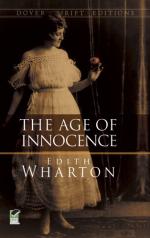Archer’s heart was beating violently when he rang old Mrs. Mingott’s bell. He had wanted above all things to go alone, for he felt sure the visit would give him the chance of saying a word in private to the Countess Olenska. He had determined to wait till the chance presented itself naturally; and here it was, and here he was on the doorstep. Behind the door, behind the curtains of the yellow damask room next to the hall, she was surely awaiting him; in another moment he should see her, and be able to speak to her before she led him to the sick-room.
He wanted only to put one question: after that his course would be clear. What he wished to ask was simply the date of her return to Washington; and that question she could hardly refuse to answer.
But in the yellow sitting-room it was the mulatto maid who waited. Her white teeth shining like a keyboard, she pushed back the sliding doors and ushered him into old Catherine’s presence.
The old woman sat in a vast throne-like arm-chair near her bed. Beside her was a mahogany stand bearing a cast bronze lamp with an engraved globe, over which a green paper shade had been balanced. There was not a book or a newspaper in reach, nor any evidence of feminine employment: conversation had always been Mrs. Mingott’s sole pursuit, and she would have scorned to feign an interest in fancywork.
Archer saw no trace of the slight distortion left by her stroke. She merely looked paler, with darker shadows in the folds and recesses of her obesity; and, in the fluted mob-cap tied by a starched bow between her first two chins, and the muslin kerchief crossed over her billowing purple dressing-gown, she seemed like some shrewd and kindly ancestress of her own who might have yielded too freely to the pleasures of the table.
She held out one of the little hands that nestled in a hollow of her huge lap like pet animals, and called to the maid: “Don’t let in any one else. If my daughters call, say I’m asleep.”
The maid disappeared, and the old lady turned to her grandson.
“My dear, am I perfectly hideous?” she asked gaily, launching out one hand in search of the folds of muslin on her inaccessible bosom. “My daughters tell me it doesn’t matter at my age—as if hideousness didn’t matter all the more the harder it gets to conceal!”
“My dear, you’re handsomer than ever!” Archer rejoined in the same tone; and she threw back her head and laughed.
“Ah, but not as handsome as Ellen!” she jerked out, twinkling at him maliciously; and before he could answer she added: “Was she so awfully handsome the day you drove her up from the ferry?”
He laughed, and she continued: “Was it because you told her so that she had to put you out on the way? In my youth young men didn’t desert pretty women unless they were made to!” She gave another chuckle, and interrupted it to say almost querulously: “It’s a pity she didn’t marry you; I always told her so. It would have spared me all this worry. But who ever thought of sparing their grandmother worry?”




